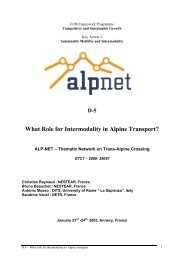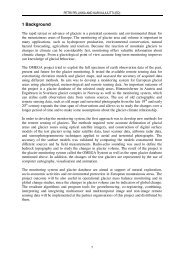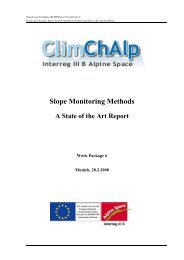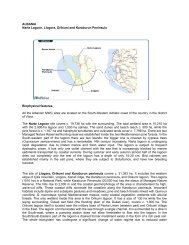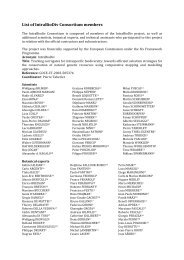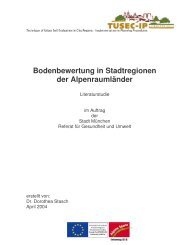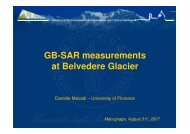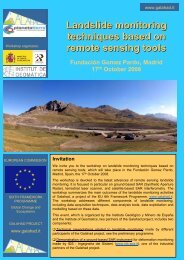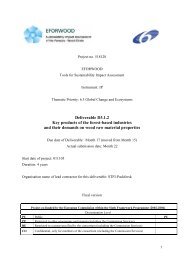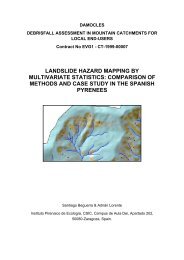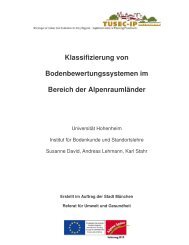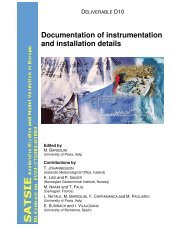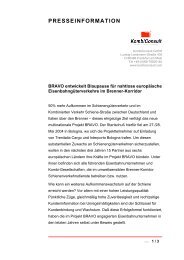Environmental Aspects of Sustainable Mobility - Transport Research ...
Environmental Aspects of Sustainable Mobility - Transport Research ...
Environmental Aspects of Sustainable Mobility - Transport Research ...
Create successful ePaper yourself
Turn your PDF publications into a flip-book with our unique Google optimized e-Paper software.
oad pricing and parking pricing to move towards the internalisation <strong>of</strong> external costs) andthe promotion <strong>of</strong> public transport (to meet the priority objective <strong>of</strong> modal shift), according tothe characteristics <strong>of</strong> the city in question (Brand et al, 2000). Communication, informationand marketing are all important when trying to increase the use <strong>of</strong> public transport andother modes <strong>of</strong> sustainable transport. Such s<strong>of</strong>t measures are relative inexpensive and areefficient, especially when combined with other measures such as infrastructureimprovements (TRENDSETTER). Policies need to be designed carefully to avoidunwanted effects; for example, car sharing may reduce the use <strong>of</strong> public transport (ICARO,1999), whilst encouragement <strong>of</strong> tele-working may simply divert car use to other trips(COMMUTING, TELEWORKING AND TRANSPORT).Continued use <strong>of</strong> integrated land-use and transport planning is required in order toencourage development that is most amenable to the use <strong>of</strong> public transport, walking andcycling (TRANSPLUS, 2003; Gayda, 2005).Finally, governments need to ensure that fiscal regimes are suitably aligned to transportpolicy, so that for example there are no tax-based disincentives to the use <strong>of</strong> car sharing(ICARO, 1999).4.4 Sub-theme 3: Development <strong>of</strong> environment-friendlyforms <strong>of</strong> transport4.4.1 Background<strong>Research</strong> results reported in the former thematic paper (Jopson, 2006) had beenconcerned with the introduction <strong>of</strong> new environment-friendly technologies and transportconcepts to reduce energy resource use for transport, improve air quality, reduce transportrelated noise, avoid waste and recycle waste related to transport.More specifically, EU-funded research demonstrated and evaluated the social,environmental and economic factors affecting the viability <strong>of</strong> hydrogen based bus service,including the refuelling infrastructure. The study has concluded that the costs <strong>of</strong> hydrogeninfrastructure and bus operations are not yet commercially viable.Measures to improve sustainable urban mobility through the use <strong>of</strong> electric vehicles, carsharing and promotion <strong>of</strong> walking and cycling have been the focus <strong>of</strong> research in a number<strong>of</strong> European projects.Technological developments that can contribute to more environmentally friendlytransportation have also been investigated. An example is the use <strong>of</strong> compositesThematic <strong>Research</strong> Summary: “<strong>Environmental</strong> <strong>Aspects</strong> <strong>of</strong> <strong>Sustainable</strong> <strong>Mobility</strong>” Page: 35 <strong>of</strong> 48<strong>Transport</strong> <strong>Research</strong> Knowledge Centre



